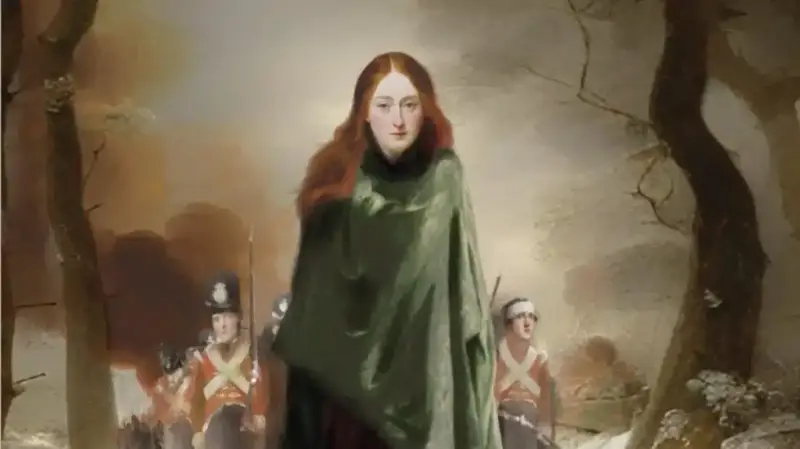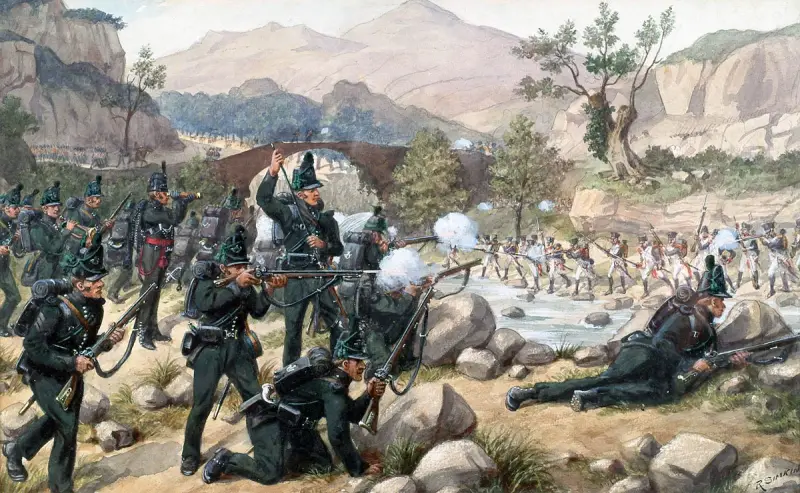Wives and children in the English army at the beginning of the 19th century

On this history I came across it by accident. It was incomplete and somewhat blurry. I decided to delve into foreign sources to find out whether this was true or not. It turned out that yes - in 1807, a thousand women and their children accompanied British infantry on a march across Spain in the hope of driving away Napoleon.
They suffered, died and were forgotten. They were something like baggage or equipment typical of early 19th century battles. There was no room for them in the carts, even when they were wounded. After all, carts are only for weapons, wounded soldiers and food.
The women walked in the rain and snow. They had to learn to survive on half the food rations of the soldiers. Also living with the shadows of unfounded doubts about their reputation cast by those who wondered what these women were doing in a battalion full of men.
Their exact number is unknown, they have no name or past, they are simply not listed, as if they never existed. Just a faint trail accompanying an army of 31 men.
Why did the women accompany you?
The English battalion, together with its wives, advanced on the cities of Castile, Leon and Galicia. They did this under very harsh conditions for six hellish months, from July 1807 to January 1808. They saved Spain from the clutches of Napoleon. But then they were forced to retreat from Salamanca to La Coruña.
These women were the wives of soldiers and the mothers of their children. The women, more out of suffering than out of love, were forced to follow them across the Iberian Peninsula, first in attack and then in retreat.
There is very little information about the withdrawal of British troops. The Spaniards did not help them, because they themselves were already at zero. Napoleon could have finished them off with one march, but the British were saved by winter, and the French did not pursue them. However, winter played a cruel joke both on the British themselves and on their wives, of whom several hundred died.
They chose to accompany the men themselves. They drew lots, and almost every soldier's wife dreamed of this. This has been a long tradition in England. Approximately 6% of soldiers could take their wives with them. And about 1 women went on a hike. This step was actually a leap from one misfortune to another, from peace to war. Those who were chosen by lot to be included in the group of "followers" ended up in an army in which they had no rights.
Most of the infantrymen came from Ireland and Scotland and belonged to dysfunctional families. For men it was a way to provide themselves with food and drink. There were those who did it to understand the world.
What choice did their women have in the difficult circumstances in which they found themselves?
To remain alone would mean facing hunger, poverty and possibly prostitution, so many asked permission to accompany their husbands.

The battle between the British and the French in the Pyrenees
A year of torment
For women there was hardly any difference between the hardships in which they lived and those that awaited them in the war. In both they had to fight for survival, so many were able to endure all these hardships. Not all women present in the troops lived the same way. Officers' wives had rights and privileges that were denied to other wives. For example, such as travel in carriages or access to good food. The officers had attendants. The wives of infantrymen were, in many cases, assigned to serve the wives of high command.
That winter of 1807 - early 1808 was especially cold and harsh. Disease, hunger and low temperatures sometimes killed more than gunpowder. The ladies had to do work in the camp. These were seasoned women, accustomed to hardships. Many were from rural areas and worked as laundresses or in the textile industry.
Without rights, but with responsibilities: while men served, they had to take care of food, work as nurses, cook and look after their children. Under these conditions, they also performed tasks such as transporting firewood, food and ammunition, making cartridges, sewing uniforms or helping the wounded. In many cases, they had to transport the bodies of their dead husbands or the bodies of other soldiers. The wives were given half the ration. Having dry clothes was a luxury.
The death of her husband meant leaving. Widows remarried because otherwise they would have been kicked out of the camp. Some did this three or four times in one campaign.
In many cases, the husband himself prepared his wife, saying that if the opportunity presented itself, she should marry his friend, whom he trusted. Colonels were legally authorized to perform ceremonies in situations where priests were not present.
In November 1808, the British army waited almost a month to regroup in Salamanca. There is joy in the city, they are trying to help the British, because they came here to get rid of the French. Women were housed in nunneries. But there was a case when the nuns in the monastery of Santa Clara opposed this. They mistook the soldiers' wives for prostitutes. Well, it’s true, it’s hard to believe that wives and children themselves went to war. And women were thought so poorly of in many Spanish towns, although they were still heroines helping soldiers just like that. By the way, those nuns in Salamanca later became friends with the women and accepted them.
In December, women are invited to return to Portugal and from there back to the UK. Only a few agree; most stay with their husbands. The British decide to retreat, because 40 soldiers are coming to them from France. From Salamanca begins the challenging journey to A Coruña. 000 kilometers of cold, hunger and looting on the part of the British troops gave rise to hostility instead of the good reception they had previously received.
Not much information has reached us about this march and the role of wives in it. Irish General Charles Stuart wrote about the campaign of British troops in Spain.
There is even less information about the hardships of women, but the diary of Catherine Exley, the wife of a British soldier, survives in English. Here is a line from the diary:
Quite a terrible fate for these women. On their islands they lived poorly, their husbands went to fight for food, glory, travel, less often at the call of their hearts or the call of the government.
His wife, most likely, could not build a normal life without him. All that remained was to go to war with him, where she would not be considered a full-fledged person, and her husband could be killed at any moment. If she has a child there, then she will have to take care of him right on the hike. And all this with terrible logistics.
Information